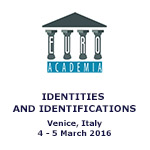Euroacademia Conferences
 Europe Inside-Out: Europe and Europeanness Exposed to Plural Observers (9th Edition) April 24 - 25, 2020
Europe Inside-Out: Europe and Europeanness Exposed to Plural Observers (9th Edition) April 24 - 25, 2020 Identities and Identifications: Politicized Uses of Collective Identities (9th Edition) June 12 - 13, 2020
Identities and Identifications: Politicized Uses of Collective Identities (9th Edition) June 12 - 13, 2020 8th Forum of Critical Studies: Asking Big Questions Again January 24 - 25, 2020
8th Forum of Critical Studies: Asking Big Questions Again January 24 - 25, 2020 Re-Inventing Eastern Europe (7th Edition) December 13 - 14, 2019
Re-Inventing Eastern Europe (7th Edition) December 13 - 14, 2019 The European Union and the Politicization of Europe (8th Edition) October 25 - 26, 2019
The European Union and the Politicization of Europe (8th Edition) October 25 - 26, 2019 Identities and Identifications: Politicized Uses of Collective Identities (8th Edition) June 28 - 29, 2019
Identities and Identifications: Politicized Uses of Collective Identities (8th Edition) June 28 - 29, 2019 The European Union and the Politicization of Europe (7th Edition) January 25 - 26, 2019
The European Union and the Politicization of Europe (7th Edition) January 25 - 26, 2019 7th Forum of Critical Studies: Asking Big Questions Again November 23 - 24, 2018
7th Forum of Critical Studies: Asking Big Questions Again November 23 - 24, 2018 Europe Inside-Out: Europe and Europeanness Exposed to Plural Observers (8th Edition) September 28 - 30, 2018
Europe Inside-Out: Europe and Europeanness Exposed to Plural Observers (8th Edition) September 28 - 30, 2018 Identities and Identifications: Politicized Uses of Collective Identities (7th Edition) June 14 - 15, 2018
Identities and Identifications: Politicized Uses of Collective Identities (7th Edition) June 14 - 15, 2018
Transcending Borders: Sheila Mysorekar’s Reflections on Transnational Identities
-
-

-
Presentation speakers
- Jennifer E. Michaels, Grinnell College, USA
- Download presentation
Abstract:
The Indian-German essayist, poet, and journalist Sheila Mysorekar is a strong voice in debates about racism, multiculturalism and transnational identities in Germany. She consistently addresses human rights and minority concerns in her writing and uses satire as an effective strategy to underscore her arguments. For her identities are political. She discusses growing up with a dark skin in a predominantly white environment. To combat her isolation in German society, Mysorekar formed coalitions with black Germans and other minority and migrant groups. She defines black politically to encompass all people of color from former colonies of the “Third World.” For Mysorekar blackness is inclusive and transcends national and ethnic boundaries. In keeping with her strong voice for minorities in Germany Mysorekar collaborated with the Turkish-German comedian and cabaret artist Fatih Çevikkollu on Der Moslem-TÜV (2008). They apply TÜV, an abbreviation of Technischer Überwachungs-Verein, responsible for ensuring the safety of such products as vehicles, satirically to a test for German citizenship designed to “protect” Germans from Muslims. In 2009 Mysorekar published her own satires Dienstags gibt es Tantra-Sex: Politische Satiren über Rassismus, Sex und den Neandertaler (Tuesdays There is Tantra-Sex: Political Satires About Racism, Sex and the Neanderthal) in which she satirizes a wide variety of cultural and political practices, including issues of migration and concerns about illegal immigration. The first and only “pure” European, she writes, was the Neanderthal who was later displaced by hordes of illegal African immigrants, namely the intelligent Homo sapiens. Therefore, she concludes, the ancestors of all Germans were illegal immigrants. Mysorekar deconstructs notions of identity based on race and, using her daughter, who is of Indo-Anglo-German-African-Italian-Argentinean-Chilean heritage, as an example, she gives a nuanced picture of multi-ethnic identities, which in her view undermine notions of a “homeland,” tied to place and transcend borders and boundaries.
-
Related Presentations

Performing the Sami Experience
- Kristine Nielsen

Public Movement: Performing Politics through Conflictual Coreographies
- Francesco Spampinato

The Gendered Sense of Self: Performing Identities Within Biographical Narratives
- Noemi Basanta Llanes

Romanian Dacianism and the Production of a “Vernacular Modernity” in the Context of the Europeanization Process
- Ioana Virginia Brezeanu













